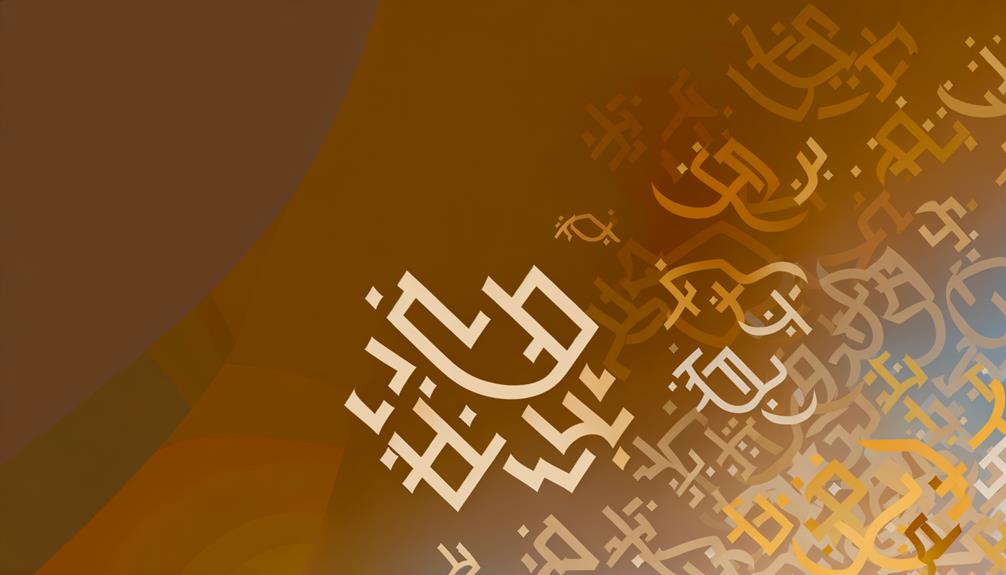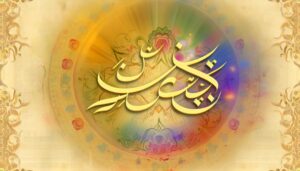Adam Name Meaning in Urdu
The name 'Adam' in Urdu carries deep cultural and religious significance. Stemming from the Hebrew word 'adamah,' meaning earth, it underscores a profound bond between humanity and nature.
Adam is recognized as the first human created by God and the first prophet in Islam. This name symbolizes humanity's origins, moral virtues, and connection to the earth, themes often explored in Urdu literature.
Choosing 'Adam' reflects an enduring respect for history and a link to universal human values. There's much more to uncover about the profound layers of this significant name.

Key Takeaways
- 'Adam' in Urdu signifies the first human created by God from clay.
- The name 'Adam' has a deep connection to the earth, derived from the Hebrew 'adamah.'
- Adam is revered as the first prophet in Islamic tradition.
- In Urdu culture, 'Adam' symbolizes humanity's origins and inherent link to nature.
- The name 'Adam' is cherished for its historical significance and moral teachings.
Etymology of Adam
The name 'Adam' originates from the Hebrew word 'adamah,' which means 'earth' or 'ground.' When you consider this, it reflects a deep connection between humanity and the earth itself.
Culturally, the name suggests a foundational role, emphasizing our roots and origins. Concerning etymology, 'adamah' is derived from the ancient Semitic root 'a-d-m,' which relates to soil or clay. This linguistic connection underscores how ancient peoples viewed the relationship between humans and their environment.
You see, the name Adam isn't just a simple label; it's imbued with layers of meaning that tie us to the very ground we walk on. Understanding this can enrich your appreciation for the name's profound historical and cultural significance.
Adam in Abrahamic Religions
You can see this deep-rooted significance also reflected in the role Adam plays across Abrahamic religions. In Christianity, Judaism, and Islam, Adam is recognized as the first human created by God. Each tradition shares the story of Adam's creation from clay or dust, emphasizing his role as the progenitor of humanity.
In Hebrew, 'Adam' is linked to 'adamah,' meaning earth, underscoring his creation from soil. In Islam, Adam is also considered the first prophet, bridging the divine and human domains. This shared narrative highlights Adam's foundational place in spiritual history, symbolizing the unity and diversity of human origins.
Understanding Adam's role offers insight into the interconnectedness of these faiths and their cultural contexts.
Cultural Significance in Urdu
When you explore the cultural significance of the name Adam in Urdu, you'll find rich historical contexts and origins rooted in ancient texts.
Literary and religious references to Adam in Urdu literature often highlight themes of creation and human essence.
Understanding these elements provides a deeper appreciation of the name’s profound impact in Urdu-speaking communities. The cultural and historical context behind names often reflects the values and aspirations of a society. Specifically, the rehan name significance in urdu lies in its meaning, which symbolizes growth and beauty, resonating with the community’s desire for prosperity and resilience. As such, the name not only serves as a personal identifier but also embodies a shared cultural narrative that enriches the lives of those who carry it.
Historical Context and Origins
Rooted deeply in ancient scriptures and Islamic tradition, the name 'Adam' holds profound cultural and historical significance in Urdu-speaking communities.
You might find it intriguing that 'Adam' is derived from the Hebrew word 'Adamah,' meaning 'earth' or 'ground,' symbolizing the creation of the first human from clay.
In Islamic context, Adam (آدم) is revered as the first prophet and the father of humanity. Understanding its etymology helps you appreciate its significance.
The name also appears in early Semitic cultures, which further enriches its historical tapestry. This cultural heritage is reflected in the reverence and respect Urdu-speaking communities have for the name, making it a timeless choice for many families.
Literary and Religious References
Building on its rich historical roots, the name 'Adam' frequently appears in Urdu literature and religious texts, underscoring its profound cultural and spiritual significance. In Islamic tradition, Adam is revered as the first prophet, symbolizing humanity's origin and divine guidance.
Urdu poetry and prose often reference Adam to explore themes of creation, innocence, and the relationship between man and the divine.
Etymologically, 'Adam' stems from the Hebrew word ‘Adamah,' meaning earth or ground, reflecting the belief that humans were created from clay. This concept resonates deeply in Urdu culture, bridging linguistic, religious, and literary dimensions.
Literary References
In literature, the name Adam often symbolizes humanity's origins and inherent connection to nature. You'll find Adam referenced in works ranging from John Milton's 'Paradise Lost' to Mary Shelley's 'Frankenstein.'
These texts use Adam to explore themes of creation, innocence, and the fall from grace. Etymologically, Adam derives from the Hebrew word 'adamah,' meaning earth or ground, underscoring his role as the first human formed from the soil.
This etymology enriches his literary portrayals, emphasizing a deep, almost primal link to the natural world. In Urdu literature, Adam's symbolism remains potent, often reflecting universal themes of human existence and moral complexity.
Understanding Adam's literary references enhances your grasp of his cultural and historical significance.
Modern Usage
In today's world, you'll notice that the name Adam remains popular among youth, reflecting both historical roots and modern trends. Its cultural significance continues to resonate, bridging traditional values with contemporary appeal.
Understanding its etymology and usage can offer deeper insights into why this name endures across generations.
Contemporary Naming Trends
Modern parents often choose the name Adam due to its timeless appeal and significant cultural heritage. You'll find Adam popular across various cultures, reflecting its universal charm.
Etymologically, Adam originates from the Hebrew word 'adamah,' meaning 'earth' or 'ground,' symbolizing creation and life. In contemporary naming trends, Adam stands out for its simplicity and classic sound, making it a favorite in both Western and Eastern societies.
Moreover, it transcends religious boundaries, being embraced by Christian, Jewish, and Muslim communities alike. You might notice that Adam's usage remains steady, reflecting its enduring nature.
Parents appreciate its straightforward pronunciation and the deep historical roots it carries, ensuring their child's name resonates with meaning and legacy.
Cultural Significance Today
Ever pondered why the name Adam continues to hold cultural significance today despite the passage of centuries?
The name's enduring appeal can be traced to several key factors:
- Biblical Roots: Adam is prominently featured in religious texts, symbolizing the first man and humanity's origin.
- Universal Appeal: The simplicity and universality of the name make it easy to pronounce across various languages.
- Cultural Representation: Adam appears in literature, films, and media, maintaining its relevance.
- Etymological Strength: Derived from Hebrew, meaning 'earth' or 'man,' it resonates with fundamental human identity.
These elements guarantee that Adam remains a timeless choice, bridging ancient traditions with modern sensibilities.
It's a name imbued with history yet adaptable to contemporary culture.
Popularity Among Youth
You'll frequently find the name Adam among today's youth, reflecting its continued popularity and cultural resonance. The simplicity and timeless appeal of Adam make it a favorite choice for parents.
Derived from the Hebrew word 'adamah,' meaning 'ground' or 'earth,' Adam carries a deep, symbolic connection to human origins. Its usage transcends cultural and religious boundaries, maintaining relevance in diverse communities, including Urdu-speaking ones.
Modern parents appreciate its straightforward pronunciation and universal recognition. The name Adam embodies a blend of tradition and modernity, appealing to families seeking a name that's both meaningful and contemporary.
Adam's Virtues
Adam's virtues, frequently celebrated in both religious texts and cultural narratives, encompass wisdom, humility, and steadfastness. When you examine the etymology of the name Adam, you uncover deep-rooted qualities that transcend time and culture.
These virtues are illustrated through:
- Wisdom: Adam is often portrayed as possessing profound understanding and judgment.
- Humility: Despite his significant role, he embodies modesty and self-awareness.
- Steadfastness: His resilience and unwavering commitment are highlighted in various stories.
- Guidance: As a foundational figure, Adam's life offers lessons and moral direction.
In Urdu culture, these attributes resonate deeply, reinforcing the name's significance. By understanding these virtues, you gain insight into why Adam remains a cherished and respected name.
Impact on Generations
Through the corridors of time and across generations, the name Adam has consistently imparted its profound virtues and moral lessons to countless individuals. You can see this influence in cultural, religious, and historical contexts. Adam, derived from the Hebrew 'adamah' meaning 'ground' or 'earth,' symbolizes humanity's intrinsic connection to nature and moral integrity. Each generation carries this legacy forward, ensuring these values are embedded deeply within societal fabrics.
| Generation | Cultural Impact | Core Values |
|---|---|---|
| Ancient | Foundation of human lineage | Humility, Responsibility |
| Medieval | Religious teachings | Obedience, Faith |
| Modern | Ethical frameworks | Equality, Justice |
| Contemporary | Moral and social guidance | Empathy, Environmental Stewardship |
Understanding Adam's enduring impact helps you appreciate its timeless relevance.
Conclusion
So, there you have it. Adam's name, revered in Urdu and seasoned with cultural and religious significance, isn't just a label—it's a legacy.
You'd think naming someone Adam would instantly bestow upon them virtues and wisdom, right? Well, maybe not, but at least they'll have a name with a rich etymological tapestry to brag about.
So, go ahead, name your kid Adam and enjoy the historical baggage that comes with it.






